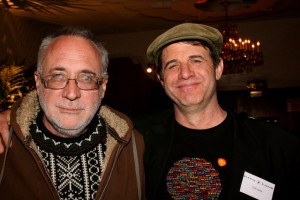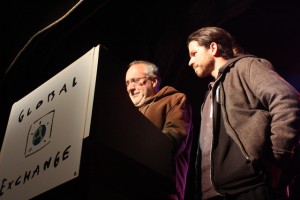 I had the privilege of starting out the year witnessing, firsthand, the unfolding of the Egyptian revolution in Tahrir Square. I saw people who had been muzzled their entire lives, especially women, suddenly discovering their collective voice. Singing, chanting, demanding, creating. And that became the hallmark of entire year–people the world over becoming empowered and emboldened simply by watching each other. Courage, we learned in 2011, is contagious!
I had the privilege of starting out the year witnessing, firsthand, the unfolding of the Egyptian revolution in Tahrir Square. I saw people who had been muzzled their entire lives, especially women, suddenly discovering their collective voice. Singing, chanting, demanding, creating. And that became the hallmark of entire year–people the world over becoming empowered and emboldened simply by watching each other. Courage, we learned in 2011, is contagious!
1. The Arab Spring protests were so astounding that even Time magazine recognized “The Protester” as Person of the Year. Sparked by Tunisian vendor Mohamed Bouazizi‘sself-immolation to cry out against police corruption in December 2010, the protests swept across the Middle East and North Africa—including Egypt,Libya, Bahrain, Syria, Yemen, Algeria, Iraq, and Jordan. So far, uprisings have toppled Tunesian President Ben Ali, Egyptian President Hosni Mubarak, and Libyan leader Muammar Gaddafi–with more shake-ups sure to come. And women have been on the front lines of these protests, highlighted recently by the incredibly brave, unprecedented demo of 10,000 Egyptian women protesting military abuse.
2. Wisconsin caught the Spring Fever, with Madison becoming home to some 100,000 protesters opposing Governor Walker’s threat to destroy collective bargaining and blame the state’s economic woes on public workers. Irate Wisconsinites took over the Capitol, turning it into a festival of democracy, while protests spread throughout the state. The workers managed to loosen the Republican stranglehold on Wisconsin state government and send a message to right-wing extremists across the country. This includes Ohio, where voters overwhelmingly rejected Governor Kasich’s SB 5, a measure designed to restrict collective bargaining rights for more than 360,000 public employees. A humbled Kasich held a press conference shortly after the vote, saying: “The people have spoken clearly. You don’t ignore the public.”
3. On September 17 Occupy Wall Street was born in the heart of Manhattan’s Financial District. Protesters railed against the banksters and corporate thieves responsible for the economic collapse. The movement against the greed of the richest 1% spread to over 1,400 cities in the United States and globally, with newly minted activists embracing–with gusto–people’s assemblies, consensus decision-making, the people’s mic, and upsparkles. Speaking in the name of the 99%, the occupiers changed the national debate from deficits to inequality and corporate abuse. Even after facing heightened police brutality, tent city evictions, and extreme winter weather, protesters are undeterred and continue to create bold actions–from port shut-downs to moving money out of big banks. As Occupy Wall Street said, “You can’t evict an idea whose time has come.” Stay tuned for lots more occupation news in 2012.
4. After 8 long years, U.S. troops were finally withdrawn from Iraq. Credit the Iraqis with forcing Obama to stick to an agreement signed under President Bush, and the peace movement here at home for 8 years of opposition to a war our government should never have started. The US invasion and occupation left the country devastated, and Obama’s administration is keeping many thousands of State Department staff, spies and military contractors in the world’s biggest “embassy” in Baghdad. But the withdrawal marks the end of a long, tragic war and for that we should give thanks. Now let’s hold the war criminals accountable!
5. The 2011 Nobel Peace Prize was presented to three terrific women: Ellen Johnson Sirleaf, the president of Liberia; Leymah Gbowee, the Liberian peace activist; and Yemeni pro-democracy campaigner Tawakkol Karman. A total of only 15 women have received the Nobel Peace Prize since it was first awarded in 1901.These three women were recognized for their non-violent struggle for women’s safety and for women’s rights to participate in peace-building work. Never before in history have three women been awarded the prize simultaneously. How inspiring!
6. The bloated Pentagon budget is no longer immune from budget cuts. The failure of the super-committee means the Pentagon budget could be cut by a total of $1 trillion over the next decade — which would amount to a 23 percent reduction in the defense budget. The hawks are trying to stop the cuts, but most people are more interested in rebuilding America than fattening the Pentagon. That’s why the U.S. Conference of Mayors, for the first time since the Vietnam war, passed a resolution calling for the end to the hostilities and instead investing at home to create jobs, rebuild infrastructure and develop sustainable energy. 2011 pried open the Pentagon’s lock box. Let’s make the cuts in 2012!
7. Elizabeth Warren is running for Senate and Rep. Barbara Lee continues to inspire. After the financial meltdown in 2008, Warren was appointed chair of the Congressional Oversight Panel to investigate the bank bailout and oversee TARP–and investigate she did. She dressed down the banks and set up a Consumer Financial Protection Bureau to protect borrowers. Warren became so popular that tens of thousands of people urged her to run for the Senate in Massachusetts, which she is doing. And let’s give a shout out to Rep. Barbara Lee, who worked valiantly all year to push other issues with massive grassroots support: a bill to “only fund the withdrawal of troops from Afghanistan” and a bill to repeal the 2001 Authorization of the Use of Force bill that continues to justify U.S. interventions anywhere in the world.
8. Burmese opposition leader and Nobel Peace Prize winner Aung San Suu Kyi is running for Parliament! Released last year from nearly 15 years of house arrest, this year Suu Kyi held discussions with the Burmese junta. These talks led to a number of government concessions, including the release of many of Burma’s political prisoners and the legalization of trade unions. In November 2011, Suu Kyi’s party, the NLD, announced its intention to re-register as a political party in order run candidates in 48 by-elections. This puts Suu Kyi in the running and marks a major democratic opening after decades of abuse by the military regime.
9. Opposition to Keystone pipeline inspired thousands of new activists, together with a rockin’ coalition of environment groups across the U.S. and Canada. They brought the issue of the climate-killing pipeline right to President Obama’s door, with over 1,200 arrested in front of the White House. The administration heard them and ordered a new review of the project, but the Republican global warming deniers are trying to force Obama’s hand. Whatever way this struggle ends, it has educated millions about the tar sands threat and trained a new generation of environmentalists in more effective, direct action tactics that will surely result in future “wins” for the planet.
10. Following the tragic meltdown at the Fukushima nuclear power plant in Japan, the growing appetite for nuclear energy has been reversed. Women in Japan are spearheading protests to shut down Japan’s remaining plants and focus on green energy. Braving a cold winter, they have set up tents in front of the Ministry of Economic Affairs and pledged to continue their demonstration for 10 months and 10 days, traditionally considered in Japan as a full term that covers a pregnancy. “Our protests are aimed at achieving a rebirth in Japanese society,” said Chieko Shina, a grandmother from Fukushima. Meanwhile Germany, which has been getting almost one quarter of its electricity from nuclear power, has pledged to shut down all 17 nuclear power plants by 2022. Chancellor Angela Merkel said she hopes Germany’s transformation to more solar, wind and hydroelectric power will serve as a roadmap for other countries. Power (wind and solar, that is) to the people!
* * * * *
The common thread in the good news this year is the power of ordinary people to counter the abuse of privileged elites, whether corrupt politicians, banksters or greedy CEOs. People all over the globe are insisting that social inequality and environmental devastation are not inevitable features of our global landscape, but policy choices that can be–and must be–reversed. That certainly gives us a full plate for 2012!
Medea Benjamin is cofounder of the human rights group Global Exchange and the peace group CODEPINK.


